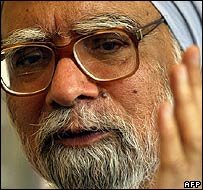NEW DELHI (Reuters) - India has put off peace talks with Pakistan due this week after suspicion for carrying out the Mumbai train bombings fell on Islamist militants based in that country, a top Indian foreign ministry official said on Sunday.
The decision came days after a series of bomb blasts in commuter trains in the country's financial and entertainment hub killed 179 people and wounded hundreds more.
Although there has been no breakthrough yet in investigations into one of India's worst terror attacks, officials suspect Pakistan-based Islamist militant group Lashkar-e-Taiba and the Pakistani military spy agency, Inter-Services Intelligence, to be behind the bombings.
"We told them the environment is not conducive," said the Indian Foreign Ministry official, who spoke to Reuters on condition of anonymity.
He was referring to talks due to be held in New Delhi on July 20-21.
There was no immediate reaction from Pakistan.
The meeting between their chief foreign ministry officials was to have reviewed progress in the peace process, launched in early 2004 after the nuclear-powered rivals went to the brink of a fourth war in 2002.
The decision to put off the talks, however, did not mean that the peace process had been called off, the official said.
"We are still committed to making peace with them. But they have to show that they can keep their promises to end terrorism before we can move forward," he said.
The official was referring to a pledge by Islamabad made in 2004 that it would not allow its territory to be used by anti-Indian militants fighting against New Delhi's rule in the disputed Himalayan region of Kashmir.
Pakistan has denied any connection with the Mumbai bombings and said Indian charges against its military spy agency were nothing more than propaganda or speculation unless New Delhi came up with evidence.
Pakistani President Pervez Musharraf has offered Islamabad's full cooperation into any investigation by India, wherever it should lead.
Tags
News India Dalits Hindhus Congress Education Caste system Untouchables China






